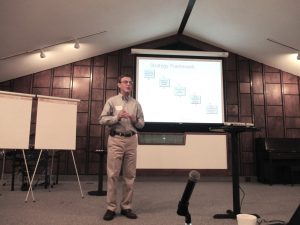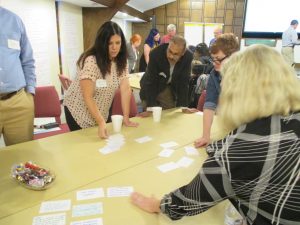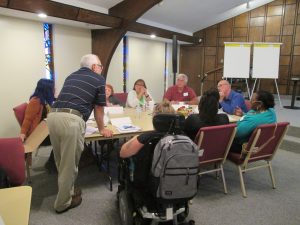Summits puts Madison County’s social issues out front
By Bob Pieper for Chronicle Media — September 26, 2018
Facilitator Zeke Swift addresses the Madison County Connected workshop on Sept. 20. (Photo courtesy of Madison County)
With Madison County widely cited as an epicenter of the nation’s opioid crisis, top U.S. Department of Health and Human Services (HHS) officials descended on Edwardsville, Sept. 20, for a roundtable meeting on local action to fight the epidemic.
The meeting came just days after Madison County launched a new countywide initiative to comprehensively address a spectrum of social service and public health issues.
Central to both efforts: Expanding access to a range of treatment and service options through partnerships and interagency cooperation.
HHS officials used the Edwardsville meeting to announce a new $1 billion federal grant program to support anti-opioid abuse programs nationwide. Illinois is to receive $44 million.
Under the grant program, states agencies, in cooperation with local communities, must formulate plans to ensure evidence-based, medication-assisted treatment is adequately available to individuals with opioid addictions.
Representing perhaps the largest convocation of top-level HHS officials ever in Southern Illinois, the meeting included U.S. Surgeon General Jerome Adams, HHS Regional Director Doug O’Brien, Deputy HHS Deputy Secretary Eric Hargan, and HHS Assistant Secretary for Mental Health and Substance Use Elinore McCance-Katz.
The roundtable, at Edwardsville’s Addiction Treatment Strategies (ATS) clinic, was intended to promote local understanding of the resources offered by the federal government and determine if existing efforts to curb opioid abuse are working, according to 12th District U.S. Rep. Michael Bost (R-Murphysboro), who attended along with 13th District U.S. Rep. Rodney Davis (R-Taylorville).
ATS, an 11-year-old, private, outpatient clinic, offers six-month neurobiological addiction treatment programs, according to a staff member. Clinic director John Crum is hoping its medically-assisted but neuro-therapy-oriented approach to curbing substance abuse, as well as related or underlying problems, will see greater use as opioid treatment initiatives are expanded.

Madison County social service providers discuss the county’s needs during the Madison County Connected workshop on Sept. 20. (Photo courtesy of Madison County)
Emphasizing need for adequate treatment coverage during the meeting was Madison County State’s Attorney Tom Gibbons, who has proposed suing selected pharmaceutical companies to recover the cost incurred by local political subdivision for treating overdoses.
Gibbons in 2014 helped launch a countywide law enforcement campaign against hard drugs, after 22 county youths died from overdoses in a single year.
Also in attendance was Kari Karidis, the principle of the Collinsville School District’s Hollywood Heights Elementary School and producer of “The Heroin Project” – a 2015 documentary on the heroin epidemic in and around Madison County.
Madison County Community Development (MCCD) hope its new Madison County Connected (MCC) initiative can provide a unified and well-coordinated way to address not only drug abuse, but poverty, unemployment, an aging population, and myriad other issues, according to MCCD Administrator Trudy Bodenbach.
Launched during a special two-day workshop, Sept. 11-12 at Alton Community Christian Church, MCC is designed “to connect Madison County individuals and families with resources to achieve healthy goals, building on their assets and strengths,” according to its mission statement.
Almost 70 representatives social service organizations, churches, and local government agencies attended the workshop.
Like most parts of the nation, Madison County offers a range of social service and health programs for those in need of assistance, Bodenbach notes. However, as in most parts of the nations, administration of those services is seldom well-coordinated; making it difficult to ensure individuals receive all necessary services and making it difficult to track the effectiveness of social services or health programs, she says.

Dave Harrison, Madison County Community Development Program coordinator, leads a breakout group at Madison County Connected workshop. (Photo courtesy of Madison County)
“A collaborative, countywide effort was long overdue and much needed in order to effectively serve our most vulnerable Madison County residents,” said Denise Ukena, assistant executive director of the Community Hope Center in Cottage Hills. Ukena and Lindsey Apple, associate pastor of Newsong Fellowship in Edwardsville, were elected co-leaders of the MCC effort, during the workshop.
Over the coming weeks, project teams, appointed during the workshop, are to finalize formal strategies on coordination of services and agencies, access-to-service issues, and marketing.
- Developing better coordination of services and agencies will involve “building a stronger network, not just a list,” Bodenbach said. “When an individual needs help, we want our member agencies to be able to immediately say: Yes, I know exactly who to call.”
- Access to service issues include transportation, disabilities, and “fear barriers,” Bodenbach said. In some cases, parents may refuse to accept services for fear it will mean they will be subject to investigation by the Illinois Department of Family Services or other agencies, she notes.
- Marketing will be a “two-pronged” initiative aimed at increasing awareness of Madison County Connected among both those in need of help and various organizations and agencies in Metro East.
In particular, Bodenbach hopes to encourage participation in MCC by area churches “which in many cases may have people with needs coming through their doors but may not have the resources to help them.”
Follow-up meetings on the coordination, access, and marketing plans are to be held within the next month.
Initially established to administer federal community development block grants, the MCCD is now in charge of numerous services for low income individuals as well as economic development in the county.
For addition information on Madison County Connected, contact the MCCD at 618-692-8940.
—- Summits puts Madison County’s social issues out front —-







